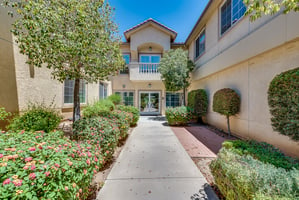As we age, we make various changes in our lives. From changing the way we eat, exercise, and go...
Simplified Guide to Riverside County’s Assisted Living Waiver Program
Navigating the complexities of healthcare services and initiatives can be overwhelming. This guide is designed to demystify the Assisted Living Waiver (ALW) program for Riverside County residents. Created to help seniors who need the level of care typically found in nursing homes, the ALW program offers financial support for living in an assisted living community.
I. An Overview of Assisted Living and the Waiver Program Assisted living can significantly improve the quality of life for seniors who live by themselves. It provides a community of peers, as well as specialized care from trained and compassionate staff. The downside, however, is that this comes with a substantial cost that may be unaffordable for seniors with limited income.
Enter the Assisted Living Waiver program. This healthcare plan aims to give seniors the option to experience the benefits of assisted living while avoiding the more clinical setting of a nursing home.
Designed for those who need nursing home-level care, the program allows seniors to reside in assisted living communities instead. The objective is to enhance seniors’ lives by offering a more home-like and comfortable setting while still delivering the essential medical and supportive care they require.
Ready to take the next step towards comfortable, community-focused living?
Contact us today for more information about our facility and the Assisted Living Waiver program!
Contact Wildomar Today
II. Advantages of the Assisted Living Waiver Program
The ALW program caters to a wide spectrum of needs essential for seniors aiming for a semi-independent lifestyle. Here’s what the program covers:
- Personal Care: Assistance with daily activities like eating, grooming, and bathing to help seniors maintain personal hygiene and a comfortable daily routine.
- Mobility Support: Assistance with movement-related tasks ensures seniors can navigate their environment safely.
- Medication Management: Oversight and administration of prescribed medicines are included, thereby minimizing the risk of medication errors.
- Transport Services: Provision of transportation for medical appointments, alleviating concerns related to travel and logistics.
- Healthcare Services: Access to necessary medical and nursing care, ensuring seniors receive appropriate and timely healthcare.
- Social and Leisure Activities: Organization of age-appropriate recreational activities to promote community engagement and mental well-being.
- Cleaning and Laundry: Housekeeping and laundry services relieve seniors from these chores, allowing them more time for leisure and other enjoyable activities.
- Nutrition: Meals are provided to ensure seniors receive the necessary nutrients, contributing to their overall health and well-being.
- Transition Support: Those moving from nursing homes receive additional support to ease their transition into their new living environment.
These features collectively contribute to seniors maintaining a high standard of living while under the ALW program.
III. Who Can Apply for the Assisted Living Waiver Program?
For eligibility in the ALW program, applicants must satisfy the following criteria:
- Age: Must be 21 years of age or older.
- Healthcare Coverage: Full-scope Medi-Cal eligibility with zero share of cost is required.
- Care Requirements: Must require a level of care equivalent to what is offered in Medi-Cal-funded nursing homes.
Note: This program is specifically designed for those who would otherwise require nursing home care, focusing eligibility criteria on substantial care needs.
Additional Requirements:
- Must be willing and able to live safely in an assisted living setting or in publicly subsidized housing.
- Must be willing to reside in a county that offers ALW services, including Riverside County.
IV. Financial Responsibilities and Aid Options
Though the ALW program provides a broad range of services, participants are expected to contribute to room and board costs. As of 2019, the rate for this was approximately $1,039 to $1,059 per month, varying by income level.
Financial Aid Options:
- HUD’s Section 202 Program: Offers subsidized housing and additional services like housekeeping and transportation for eligible seniors.
- Veterans’ Benefits: The Aid & Attendance program provides need-based financial support to qualifying seniors.
- Medicaid: Various Medicaid programs exist that offer financial assistance for assisted living, though the specifics vary by state.
- Non-Medicaid State Assistance: Riverside County has additional programs that may cover assisted living costs. These should be researched for eligibility criteria.
- Long-Term Care Insurance: Consult your insurance provider to determine if your policy provides benefits that can be used for long-term care.
- Social Security: While not directly covering assisted living costs, Social Security may offer indirect benefits. Consult your local Social Security office for more information.
V. Steps to Enroll in the Assisted Living Waiver Program
If you meet the qualifications and are keen to benefit from what the ALW program has to offer, the initial step is to complete a Medi-Cal application through your local county’s Department of Human Services. Importantly, eligibility for Medi-Cal benefits is determined at the county level, not by the state. For information on how to apply for Medi-Cal, you should reach out to your local county office.
Once your Medi-Cal application is approved, the next step involves reaching out to one of the designated care coordination agencies to request an assisted living waiver. The complete application cycle, from the point of submission to receiving confirmation, can span between three to six months.
While the Assisted Living Waiver Program is available across 15 counties in California, including Riverside County, residency in these counties is not a strict prerequisite for program qualification. This means you have the flexibility to utilize the waiver by moving to an assisted living facility in any of the counties that participate in the ALW program.
Senior care options can be complex to navigate, but initiatives like the Assisted Living Waiver aim to simplify the process by offering much-needed financial relief. Nevertheless, it’s crucial to conduct comprehensive research and perhaps consult a financial advisor to fully grasp all potential options and consequences.
When I found out about the Assisted Living Waiver (ALW) program, I was skeptical. I thought, ‘Can I really find a place that would provide me with the high-quality care I needed?’ After moving into Windomar, all my doubts were put to rest. The staff have been nothing short of amazing. They not only assist me with my daily tasks but also truly care about my well-being. And the other residents? They’ve become my new circle of friends. Thank you, ALW program, for leading me to my new home at Windomar.
Ann. W.
VI. Navigating the Specifics of Assisted Living Choices
Bear in mind that assisted living communities can vary greatly in their pricing structures and the types of financial assistance they accept. It’s crucial to engage in detailed discussions with representatives from each community you are considering. These representatives can offer clarity on the living expenses tied to their facility, as well as the types of financial assistance they recognize.
Armed with this information, you’ll be better equipped to make an informed decision that caters to both your budget limitations and care requirements. Don’t hesitate to ask for granular information on what the costs entail—ranging from meals and room services to personal and medical care.
The goal is not just to find an option that’s financially feasible, but also one that guarantees a high quality of life and meets all necessary care needs.
VII. Considering Other Senior Care Alternatives
Though the ALW program and assisted living centers are excellent routes for many seniors, they aren’t the sole options. For some, home care could be a more convenient or economical choice. Alternatively, residential care homes, sometimes referred to as board and care homes, might be a better fit.
Each choice comes with its own pros and cons, and the best route will vary depending on an individual’s unique situation and needs. It’s essential to investigate all the alternatives before arriving at a decision. Consult social workers, care managers, and other experts to guide you through this phase.
VIII. Seeking Expert Guidance and Looking Ahead
While this guide seeks to offer an exhaustive outline of the Assisted Living Waiver program, consulting a skilled financial advisor for personalized advice is always recommended.
Elder care planning is a long-haul commitment. Anticipate future needs and potential changes in health conditions. A facility that’s suitable now might not remain so in the years to come. Advance planning, with professional input, can ease future transitions when they become inevitable.
Be mindful that assisted living facilities, especially those accepting the Assisted Living Waiver, can reach full capacity quickly. As such, it’s advisable to commence the application process as early as possible and be prepared for potential waitlists.
IX. Concluding Remarks
The Assisted Living Waiver program serves as a valuable lifeline, aiding seniors in Riverside County and throughout California in obtaining the care they require in a more desirable setting. By familiarizing yourself with the qualifications, financial commitments, and application procedures, seniors and their families can make enlightened decisions about their care options.
This guide aims to be a resourceful tool in helping you understand the Assisted Living Waiver Program. Remember, multiple resources exist to assist you in this journey—from care coordinators to social workers and financial consultants. The path may be strenuous, but equipped with the right knowledge and support, you can secure an optimal care setting that satisfies your needs and ensures a quality life.
Assisted Living Waiver FAQ:
1. What is ALW?
ALW stands for Assisted Living Waiver. It’s a program offered by California’s Department of Health Care Services to provide a home-like environment for Medi-Cal beneficiaries who need care services that are typically offered in a nursing facility.
2. Who can apply for the Assisted Living Waiver (ALW) Program?
To apply for the ALW program, an individual must meet the following eligibility criteria:
- Age 21 or older
- Have full-scope Medi-Cal eligibility with zero share of the cost
- Have care needs equal to those of Medi-Cal-funded residents living and receiving care in Nursing Facilities
3. What services are covered under the Assisted Living Waiver program?
The ALW program covers a wide range of services, such as help with everyday activities and chores (including eating, grooming, bathing, and toileting), help with mobility-related activities, administering prescribed medication, providing transportation for medical checkups, organizing various social and recreational activities, and help with housekeeping, laundry, and meals.
4. What costs are not covered by the Assisted Living Waiver?
The ALW program does not cover the cost of room and board. However, there may be other financial assistance options that can help to cover these costs.
5. How do I apply for the Assisted Living Waiver Program in Riverside County?
To apply for the ALW program, first, submit a Medi-Cal application to the Riverside County Department of Human Services. Once this application is approved, contact a care coordinating agency and request an assisted living waiver. The entire application process can take anywhere from three to six months.
6. Is the Assisted Living Waiver program only available in Riverside County?
No, the Assisted Living Waiver program is available in 15 counties in California. However, you don’t necessarily have to live in any of these counties to qualify for the waiver. You can still take advantage of the program by moving into an assisted living facility located in a county that offers the ALW program.
7. Are there other financial assistance options for low-income seniors?
Yes, there are several financial assistance options available for low-income seniors, such as HUD’s Section 202 Program, Veteran’s Benefits, Medicaid, Non-Medicaid State Assistance, Long-Term Care Insurance, and Social Security. The eligibility and benefits of these programs can vary, so it’s best to check with each program directly or consult with a financial advisor.
8. What alternatives are there to assisted living?
Alternatives to assisted living include home care services, adult day care services, residential care homes (also known as board and care homes), and nursing homes. The best option depends on an individual’s specific care needs, budget, and personal preferences.
Senior Care Advocacy Organizations:
Several organizations provide resources and advocacy for seniors and their families. These may include:
- AARP: AARP is a nonprofit, nonpartisan organization that empowers people to choose how they live as they age. They provide resources on a variety of topics, including health, money, leisure, and family.
- The National Council on Aging (NCOA): NCOA is a respected national leader and trusted partner to help people aged 60+ meet the challenges of aging. They offer community programs, services, and effective advocacy.
- The Alzheimer’s Association: This is the leading voluntary health organization in Alzheimer’s care, support, and research. It’s a helpful resource if your loved one has Alzheimer’s or other dementias.
- Area Agencies on Aging (AAA): These agencies provide a range of options that help older adults choose the services and living arrangements that suit them best.
- Eldercare Locator: This public service connects you to services for older adults and their families. It can also provide you with resources on a variety of topics, including care planning, housing options, and legal issues.
In addition to these resources, our facility offers continued support for our residents and their families, ensuring that the transition to assisted living is as smooth and stress-free as possible. We are committed to being a partner in your care journey, always prioritizing your comfort and well-being.
Selecting the right assisted living facility is a crucial decision that requires meticulous consideration of several factors. Here are some key aspects to consider when choosing such a facility, and how our facility is the perfect fit in our area:
1. Level of Care:
The level of care offered varies across different facilities. Some provide basic help with daily activities such as bathing, dressing, and meal preparation, while others offer extensive medical care. The level of care needed will depend on the individual’s health status and needs.
Our Facility: We provide a comprehensive and personalized level of care. We cater to both individuals who need assistance with daily activities and those who need more specialized medical attention. Our staff includes registered nurses available 24/7, ensuring that residents’ healthcare needs are met promptly and professionally.
2. Location:
The location of the facility is a crucial factor, especially if the individual would like frequent visits from family and friends. It’s also important to consider the proximity to medical facilities, local amenities, and the general environment and ambiance of the area.
Our Facility: We’re conveniently located close to town, with easy access to medical facilities, shopping centers, parks, and cultural attractions. The facility itself is in a peaceful, green, and quiet neighborhood, providing a calming and pleasant environment for our residents.
3. Amenities:
Assisted living facilities can offer a range of amenities such as fitness centers, swimming pools, in-house restaurants, and more. The types of amenities offered can significantly impact the resident’s lifestyle and enjoyment of their time at the facility.
Our Facility: Our residents enjoy a wide variety of amenities, including a state-of-the-art fitness center, an onsite restaurant offering nutritious and delicious meals, beautiful communal spaces for socializing, and a comprehensive program of activities to keep our residents engaged and entertained.
4. Staff and Community:
It’s essential to consider the quality of the staff and the overall community in the facility. The staff should be professional, friendly, and caring, while the community should be welcoming and inclusive.
Our Facility: We take pride in our highly trained, compassionate, and dedicated staff who prioritize our residents’ well-being and comfort. Our facility fosters a close-knit community with a warm and inclusive atmosphere. We frequently organize events and activities that encourage social interaction and foster strong bonds among residents.
5. Cost:
Cost is often a significant factor. Different facilities have different pricing structures, so it’s crucial to understand what the costs cover and if any additional services may incur extra charges.
Our Facility: We maintain transparency with our pricing, ensuring residents and their families understand the cost of care. We offer different packages to accommodate various budgets without compromising the quality of care.
6. Care Coordinators:
Care coordinators are a crucial part of the team, helping to navigate the complexities of senior care. They can answer questions, provide information about services and amenities, and assist with the admission process.
Our Facility: Our experienced care coordinators are available to guide you through the application process and to continue assisting with any concerns or needs during your stay. They can be reached at 951-678-1555
7. Social Workers:
Social workers provide emotional support and help address various social issues. They can assist with everything from facilitating communication between residents and their families to providing counseling.
Our Facility: We have an in-house team of social workers ready to provide support and assistance to our residents and their families. They can help you navigate through any emotional or social challenges you may encounter. You can schedule a meeting with them via our main office at 951-678-1555 or email us at info@wildomarsenior.com.


